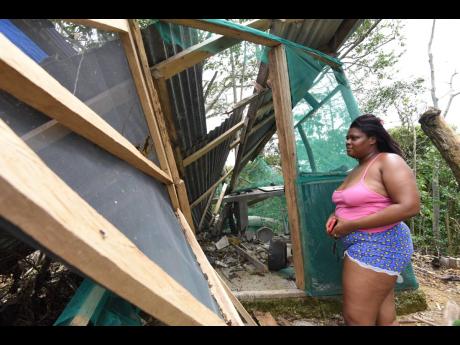Hurricane havoc
Beryl wrecks newly built slaughterhouse; farmer in limbo with 200 chickens
After investing nearly half a million dollars in a slaughterhouse just over a month ago to boost her poultry business, Lasharner Latouche only used it before it came crashing down during the passage of Hurricane Beryl last week.
She returned to her home in Clonmel, St Mary, after the hurricane, to find a large uprooted tree lying in the middle of her recently constructed slaughterhouse.
“We have to use this (slaughterhouse) to kill the chickens so that the health inspectors can pass it, so that we can sell it (chickens) to like the restaurants, schools, and anybody,” Latouche told The Gleaner on Tuesday.
She felt relieved knowing that her expensive chicken picker machine had been spared from the destructive force of the Category Four hurricane.
As of Tuesday, Clonmel still lacked electricity following Hurricane Beryl, leaving Latouche unable to slaughter some 200 chickens that had reached maturity at over six weeks old.
“Right now, we have chickens ready. They should be slaughtered but [we have] no light and we can’t do nothing. That’s a big, big setback ... ,” she said. “Honestly, what I think I have to do is run the generator, but that is very expensive. To run it for the entire day, that is $4,000 gas. To feed the chickens per day is almost $6,000.
“They are taking like a bag and a half of feeding [daily]. If the lights were on throughout the night, they would take two bags. We don’t have any light … . A bag of feeding would be like $3,050 and I still have to feed them. Luckily, it’s one set we have now because normally we would have like three sets and one would be in the nursery,” Latouche said.
Latouche said she was in limbo as, although she wants to slaughter the birds, she is not in a position for the health department to pass them without the slaughterhouse.
“It (the slaughterhouse) was just used once. Just once. From it was built, I only killed once and these chickens are seven weeks. Because the hurricane was heading here, we didn’t bother to kill them. We knew the electricity would be out, so we didn’t bother to kill them,” she told The Gleaner.
The poultry farmer said she has not reached out to the health department to inform them of her dilemma, choosing instead to just rebuild and get back in operation.
“It’s a big, big setback because most restaurants don’t want to take them without them being inspected by the health inspector,” the entrepreneur said.
“The sinks, pipes, the drums – because we have to have running water – were damaged,” Latouche said about the costly setback to her enterprise.
The community gets water once a week – on a Tuesday – and, up to the time when The Gleaner visited, there was no sign of the weekly supply.
Optimistic of rebound
Factoring in the cost of reconstruction, the damage is estimated in the hundreds of thousands of dollars. Weather permitting, she added, the rebuilding process may take two weeks.
“We are looking at almost $200,000, and, if the machine was damaged, it would be about $400,000. The machine nuh damaged, but the structure is a complete wreck,” she said.
With a food handler’s permit and registered with the Rural Agricultural Development Authority, she has aspirations to take her business venture to new levels and is optimistic of a rebound.
“I give God thanks that it was just this (slaughterhouse) because, if it was the chicken coop, it would be [a greater] loss. The foul coop would be damaged and the birds would die. The fallen tree missed the house and I am thankful; it’s a big setback, but I am giving thanks,” she said.
With no electricity, she also had to give away the meat in storage.
“We had a few birds on the fridge, but we gave it to neighbours. The chicken foot, chicken neck and gizzard, we just had to give them away,”
Agriculture Minister Floyd Green has said that the local agriculture sector sustained losses upwards of $1 billion as a result of the hurricane.

